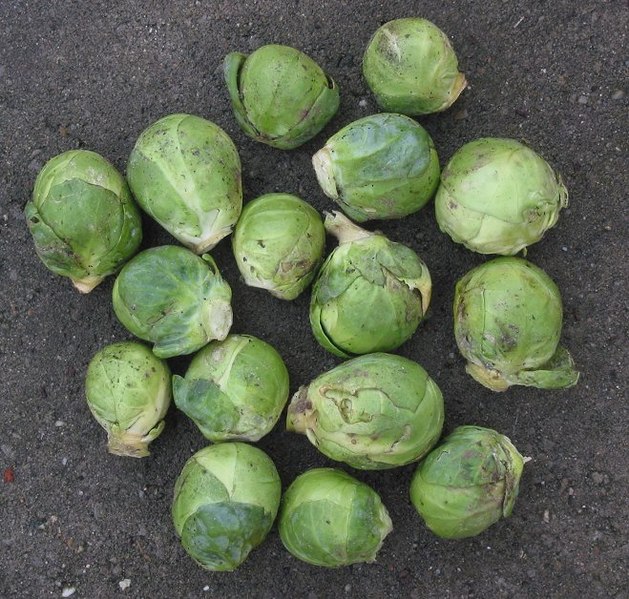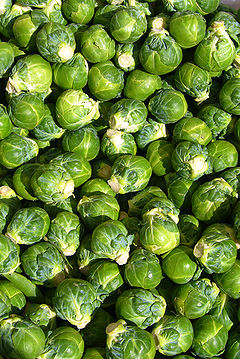In the home garden, "sprouts are sweetest after a good, stiff frost".
Brussels sprouts are a cultivar of the same species that includes cabbage, collard greens, broccoli, kale, and kohlrabi; they are cruciferous. They contain good amounts of vitamin A, vitamin C, folic acid and dietary fibre. Moreover, they are believed to protect against colon cancer, due to their containing sinigrin. Although they contain compounds such as goitrin that can act as goitrogens and interfere with thyroid hormone production, realistic amounts in the diet do not seem to have any effect on the function of the thyroid gland in humans.
Brussels sprouts, as with broccoli and other brassicas, contains sulforaphane, a chemical believed to have potent anti-cancer properties. Although boiling reduces the level of the anti-cancer compounds, steaming, microwaving, and stir frying does not result in significant loss.
Brussels sprouts are also a source of indole-3-carbinol, a chemical which boosts DNA repair in cells and appears to block the growth of cancer cells.
 The most common method of preparing Brussels sprouts for cooking begins with removal of the buds from the stalk. Any surplus stem is cut away, and the surface leaves that are loosened by this cutting are peeled and discarded. Cooking methods include boiling, steaming and roasting; however, boiling results in significant loss of anti-cancer compounds. To ensure even cooking throughout, buds of a similar size are usually chosen. Some cooks will make a single cut or a cross in center of the stem to aid the penetration. Some people buy them frozen in a microwave-safe plastic bag, microwaving them on High for five to six minutes.
The most common method of preparing Brussels sprouts for cooking begins with removal of the buds from the stalk. Any surplus stem is cut away, and the surface leaves that are loosened by this cutting are peeled and discarded. Cooking methods include boiling, steaming and roasting; however, boiling results in significant loss of anti-cancer compounds. To ensure even cooking throughout, buds of a similar size are usually chosen. Some cooks will make a single cut or a cross in center of the stem to aid the penetration. Some people buy them frozen in a microwave-safe plastic bag, microwaving them on High for five to six minutes. Whatever cooking method is employed, overcooking is to be avoided. Overcooking releases the glucosinolate sinigrin, which has a sulfurous odor. The odor is the reason many people profess to dislike Brussels sprouts, if they've only tried them overcooked with the accompanying sulfurous taste and smell. Generally 6–7 minutes boiled or steamed is enough to cook them thoroughly, without overcooking and releasing the sinigrin.
Whatever cooking method is employed, overcooking is to be avoided. Overcooking releases the glucosinolate sinigrin, which has a sulfurous odor. The odor is the reason many people profess to dislike Brussels sprouts, if they've only tried them overcooked with the accompanying sulfurous taste and smell. Generally 6–7 minutes boiled or steamed is enough to cook them thoroughly, without overcooking and releasing the sinigrin.Reference : http://en.wikipedia.org/wiki/Brussels_sprout









0 comments:
Post a Comment